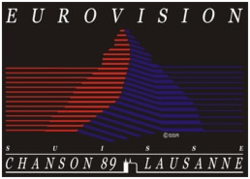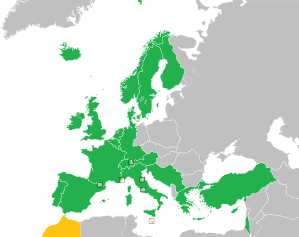Eurovision Song Contest 1989
The Eurovision Song Contest 1989 was the 34th annual Eurovision Song Contest. It was held on 6 May 1989 in Lausanne, Switzerland, after Celine Dion's victory in Dublin the previous year. The program was presented by Lolita Morena and Jacques Deschenaux. Riva, representing Yugoslavia, won with the song "Rock Me". This was the only victory for Yugoslavia as a unified state.[1] Furthermore, this was the first victory for one of the Balkan countries and this was the first winning song to be performed in one of the Slavic languages.
| Eurovision Song Contest 1989 | |
|---|---|
 | |
| Dates | |
| Final | 6 May 1989 |
| Host | |
| Venue | Palais de Beaulieu Lausanne, Switzerland |
| Presenter(s) | Jacques Deschenaux Lolita Morena |
| Conductor | Benoit Kaufman |
| Directed by | Alain Bloch Charles-André Grivet |
| Executive supervisor | Frank Naef |
| Executive producer | Raymond Zumsteg |
| Host broadcaster | Swiss Broadcasting Corporation (SRG SSR) |
| Opening act | "Ne partez pas sans moi" and "Where Does My Heart Beat Now" performed by Celine Dion |
| Interval act | Guy Tell |
| Website | eurovision |
| Participants | |
| Number of entries | 22 |
| Debuting countries | None |
| Returning countries | |
| Non-returning countries | None |
Participation map
| |
| Vote | |
| Voting system | Each country awarded 12, 10, 8–1 point(s) to their 10 favourite songs |
| Nul points | |
| Winning song | "Rock Me" |
Location
.jpg)
Lausanne is a city in the French-speaking part of Switzerland, and the capital and biggest city of the canton of Vaud. The city is situated on the shores of Lake Geneva (French: Lac Léman, or simply Le Léman).[2] It faces the French town of Évian-les-Bains, with the Jura Mountains to its north-west. Lausanne is located 62 kilometres (38.5 miles) northeast of Geneva.
Palais de Beaulieu, a convention and exhibition centre, was chosen to host the 1989 contest. The centre includes the 1,844 seat Théâtre de Beaulieu concert, dance and theatre hall. Inaugurated in 1954, the Théâtre de Beaulieu is the biggest theatre in Switzerland. The Eurovision Song Contest took place in the Hall 6 + 7 of the Palais, to the right from the main hall and the theatre.
Contest overview
The United Kingdom's Ray Caruana, lead singer with Live Report was outspoken about coming second to what he considered a much less worthy song.[3] They had been defeated by 7 points.
Two of the performers, Nathalie Pâque and Gili Natanael were respectively 11 and 12 years old at their time of competing. Due to bad publicity surrounding their participation, the European Broadcasting Union introduced the rule stating no performer is allowed to take part before the year of their 16th birthday.[4]
The previous year's winner, Celine Dion, opened the show with a mimed performance of her winning song and a mimed performance of her first English-language single, "Where Does My Heart Beat Now". The song became a top ten hit in the US a year later - effectively launching her into international success.[1]
Returning artists
Only one artist returned this year to represent their country for a second time. Marianna Efstratiou of Greece was a backing vocalist of the Greek band "Bang" in 1987.
Conductors
Each performance (except Austria, Iceland and Germany) had a conductor who led the orchestra. Unlike in most years and like in 1988, the conductors took their bows after each song, not before.





.svg.png)










.svg.png)




.svg.png)
Results
Voting structure
Each country had a jury who awarded 12, 10, 8, 7, 6, 5, 4, 3, 2, 1 point(s) for their top ten songs. There was also a change of rule in case of a tie; prior to 1989, both countries would perform their songs again until a final decision was made. However from 1989 onwards, if there was a tie at the end of the voting, the country that scored the most twelves would be declared the winner. If there was still a tie, the winner was the country that scored the most tens. And if there still was a tie after that, both countries would be declared joint winners.
Score sheet
| Juries | ||||||||||||||||||||||||
|---|---|---|---|---|---|---|---|---|---|---|---|---|---|---|---|---|---|---|---|---|---|---|---|---|
| Italy | 56 | 7 | 10 | 12 | 6 | 2 | 4 | 7 | 8 | |||||||||||||||
| Israel | 50 | 1 | 7 | 3 | 2 | 5 | 5 | 5 | 7 | 5 | 3 | 7 | ||||||||||||
| Ireland | 21 | 7 | 3 | 3 | 2 | 4 | 2 | |||||||||||||||||
| Netherlands | 45 | 10 | 3 | 3 | 1 | 4 | 4 | 7 | 6 | 1 | 6 | |||||||||||||
| Turkey | 5 | 1 | 4 | |||||||||||||||||||||
| Belgium | 13 | 5 | 5 | 2 | 1 | |||||||||||||||||||
| United Kingdom | 130 | 6 | 7 | 4 | 7 | 1 | 12 | 12 | 10 | 12 | 1 | 8 | 6 | 12 | 10 | 2 | 2 | 12 | 6 | |||||
| Norway | 30 | 2 | 2 | 5 | 8 | 2 | 6 | 4 | 1 | |||||||||||||||
| Portugal | 39 | 4 | 2 | 1 | 3 | 7 | 6 | 2 | 8 | 6 | ||||||||||||||
| Sweden | 110 | 6 | 6 | 4 | 8 | 8 | 6 | 12 | 12 | 2 | 5 | 8 | 3 | 8 | 2 | 8 | 12 | |||||||
| Luxembourg | 8 | 5 | 3 | |||||||||||||||||||||
| Denmark | 111 | 5 | 1 | 10 | 12 | 6 | 4 | 10 | 10 | 2 | 12 | 3 | 7 | 12 | 6 | 10 | 1 | |||||||
| Austria | 97 | 12 | 8 | 3 | 12 | 7 | 4 | 1 | 2 | 10 | 8 | 12 | 8 | 5 | 5 | |||||||||
| Finland | 76 | 10 | 8 | 6 | 10 | 1 | 4 | 4 | 3 | 10 | 7 | 3 | 10 | |||||||||||
| France | 60 | 3 | 5 | 6 | 4 | 5 | 1 | 8 | 3 | 5 | 3 | 7 | 5 | 2 | 3 | |||||||||
| Spain | 88 | 8 | 2 | 7 | 7 | 4 | 10 | 8 | 8 | 4 | 10 | 10 | 10 | |||||||||||
| Cyprus | 51 | 2 | 3 | 1 | 6 | 6 | 8 | 2 | 4 | 7 | 12 | |||||||||||||
| Switzerland | 47 | 4 | 4 | 10 | 8 | 8 | 3 | 2 | 1 | 7 | ||||||||||||||
| Greece | 56 | 1 | 1 | 5 | 6 | 10 | 1 | 4 | 12 | 12 | 4 | |||||||||||||
| Iceland | 0 | |||||||||||||||||||||||
| Germany | 46 | 7 | 2 | 5 | 1 | 5 | 6 | 7 | 1 | 6 | 3 | 3 | ||||||||||||
| Yugoslavia | 137 | 12 | 12 | 8 | 12 | 10 | 12 | 7 | 4 | 8 | 5 | 10 | 10 | 7 | 3 | 5 | 5 | 6 | 1 | |||||
12 points
Below is a summary of all 12 points in the final:
| № | Contestant | Voting nation |
|---|---|---|
| 5 | United Kingdom | France, Germany, Luxembourg, Norway, Portugal |
| 4 | Yugoslavia | Ireland, Israel, Turkey, United Kingdom |
| 3 | Austria | Belgium, Greece, Italy |
| Denmark | Finland, Netherlands, Sweden | |
| Sweden | Austria, Denmark, Yugoslavia | |
| 2 | Greece | Cyprus, Switzerland |
| 1 | Cyprus | Iceland |
| Italy | Spain |
Commentators
Television
Participating countries





.svg.png)










.svg.png)




.svg.png)
Radio
Some participating countries did not provide radio broadcasts for the event; the ones who did are listed below.





.svg.png)









.svg.png)


Spokespersons





.svg.png)










.svg.png)




.svg.png)
National jury members

.svg.png)




See also
References
- "Eurovision Song Contest 1989". Eurovision.tv. Retrieved 8 July 2013.
- "03 - Suisse sud-ouest". Swiss National Map 1:200 000 - Switzerland on four sheets. Federal Office of Topography, swisstopo, Swiss Federal Department of Defence, Civil Protection and Sport. 2009. Archived from the original on 11 April 2014. Retrieved 17 April 2014.
- "Grand Final: 1989". BBC.co.uk. Retrieved 8 July 2013.
- O'Connor, John Kennedy (2010). The "Eurovision Song Contest": The Official History. Carlton Books Ltd. ISBN 1847325211.
- "Eurovision Song Contest 1989". The Diggiloo Thrush. Retrieved 5 March 2012.
- "Anna Oxa e Fausto Leali Avrei voluto Eurofestival 1989". YouTube. Retrieved 2012-08-10.
- "Welkom op de site van Eurovision Artists". Eurovisionartists.nl. Retrieved 2012-08-10.
- Adriaens, Manu & Loeckx-Van Cauwenberge, Joken. Blijven kiken!. Lannoo, Belgium. 2003 ISBN 90-209-5274-9
- "La Yougoslavie Decroche L'Eurovision". Archives.lesoir.be. Retrieved 2012-08-10.
- Eurovision Song Contest 1989 BBC Archives Archived October 17, 2015, at the Wayback Machine
- "Hvem kommenterte før Jostein Pedersen? - Debattforum". Nrk.no. Archived from the original on November 2, 2012. Retrieved 2012-08-10.
- "Comentadores Do ESC - escportugalforum.pt.vu | o forum eurovisivo português". 21595.activeboard.com. Archived from the original on April 21, 2012. Retrieved 2012-08-10.
- "Infosajten.com". Infosajten.com. Archived from the original on July 18, 2012. Retrieved 2012-08-10.
- Christian Masson. "1989 - Lausanne". Songcontest.free.fr. Retrieved 2012-08-10.
- "Forside". esconnet.dk. Archived from the original on 2012-03-24. Retrieved 2012-08-10.
- Archived October 24, 2007, at the Wayback Machine
- "Selostajat ja taustalaulajat läpi vuosien? • Viisukuppila". Viisukuppila.fi. Retrieved 2012-08-10.
- "FORO FESTIVAL DE EUROVISIÓN • Ver Tema - Uribarri comentarista Eurovision 2010". Eurosongcontest.phpbb3.es. Archived from the original on 2012-03-17. Retrieved 2012-08-10.
- Savvidis, Christos (OGAE Cyprus)
- "Η Δάφνη Μπόκοτα και η EUROVISION (1987-2004)". Retromaniax.gr. Archived from the original on 2012-09-12. Retrieved 2012-08-10.
- "Söngvakeppnin: Fjórir valdir til að syngja bakraddir". Mbl.is. Retrieved 2012-08-10.
- "Eurovision Song Contest 1989". Ecgermany.de. Retrieved 2012-08-10.
- "פורום אירוויזיון". Sf.tapuz.co.il. 1999-09-13. Archived from the original on October 8, 2011. Retrieved 2012-08-10.
- Video on YouTube
- Dyrseth, Seppo (OGAE Norway)
- "Selostajat ja taustalaulajat läpi vuosien? • Viisukuppila". Viisukuppila.fi. Retrieved 2012-08-10.
- "Concours Eurovision de la Chanson • Consulter le sujet - Porte-paroles des jurys des pays francophones". Eurovision.vosforums.com. Retrieved 2012-08-10.
- Baumann, Peter Ramón (OGAE Switzerland)
- "Εκφωνητές της ΕΡΤ για τις ψήφους της Ελλάδας στην EUROVISION - Page 3". Retromaniax.gr. Archived from the original on 2012-09-11. Retrieved 2012-08-10.
- "000webhost.com - free web hosting provider". Eurofestival.host22.com. Archived from the original on 2011-08-15. Retrieved 2012-08-10.

